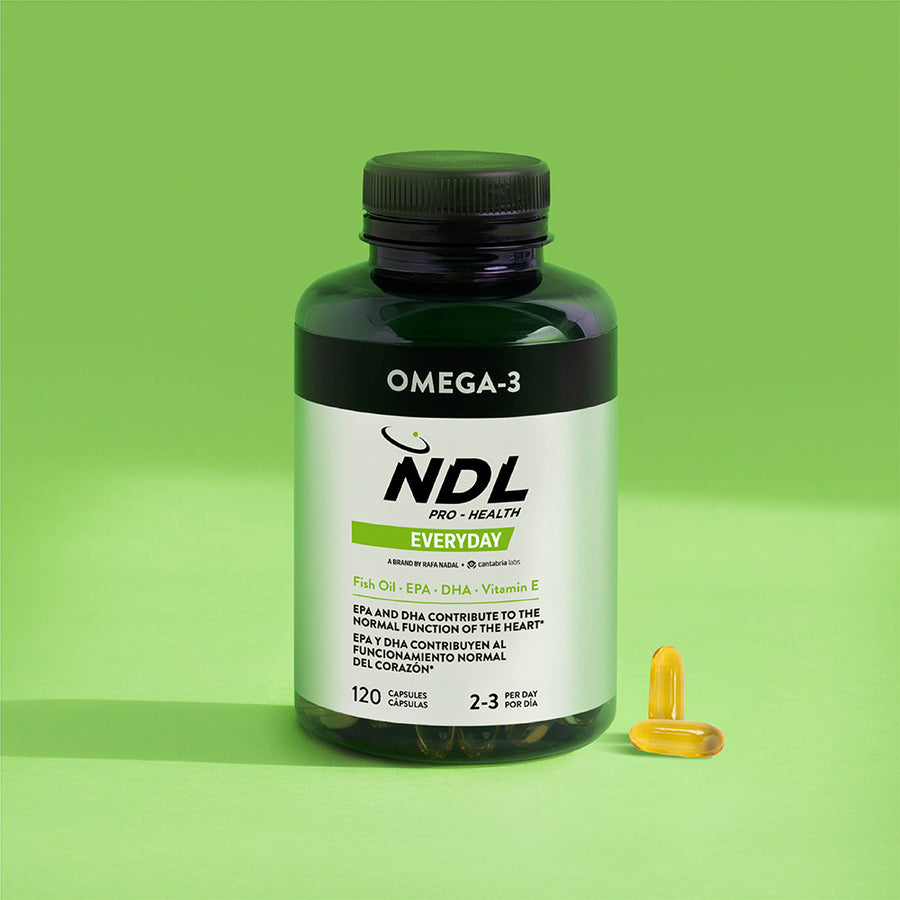Featured Products

Omega-3 with Vitamin E
See productOmega-3 is an essential nutrient with multiple health benefits, from heart to brain support. However, it's not always clear how much Omega-3 you should take per day.
In this article, we explain the different types of Omega-3 and how much you need based on your profile, whether it’s better to get it from food or supplements, and the possible effects of taking too much.
What are Omega-3 fatty acids?
Omega-3 fatty acids are a type of polyunsaturated fat essential for the body. They are considered essential because the human body cannot produce them on its own, so they must be obtained through diet or supplements.
Among Omega-3s, there are three main types, each with specific functions in the body:
- ALA (Alpha-Linolenic Acid): the plant-based form of Omega-3. Found in chia seeds, flaxseeds, walnuts, and vegetable oils (like flaxseed and canola). The body can convert it into small amounts of EPA and DHA, but the process is not efficient.
- EPA (Eicosapentaenoic Acid): mainly found in fatty fish (salmon, sardines, mackerel, tuna) and fish or krill oil supplements. It helps reduce inflammation, supports cardiovascular health, and plays a role in brain function. Along with DHA, it is linked to a lower risk of heart disease and mood disorders.
- DHA (Docosahexaenoic Acid): found in fatty fish, seafood, and some algae oils (a vegan alternative). It is crucial for brain and retinal development and function, especially during pregnancy and childhood. It supports memory, concentration, and eye health.
Omega-3s can be obtained from various dietary sources:
- Animal sources (rich in EPA and DHA): fatty fish (salmon, tuna, sardines, mackerel, herring), fish and krill oil, and Omega-3-enriched eggs.
- Plant sources (rich in ALA): chia, flax, and hemp seeds, walnuts, and vegetable oils like flaxseed and canola oil.
- Omega-3 supplements: fish or krill oil capsules, and algae oils (a vegan option rich in DHA).
These fatty acids are essential for overall health, and a balanced intake can offer long-term benefits.
Official Omega-3 intake recommendations
Various health organizations have set guidelines for daily Omega-3 intake to support optimal health. Below are the recommendations from some of the most respected nutrition and health authorities:
World Health Organization (WHO): recommends 250–500 mg of EPA + DHA per day for healthy adults, with higher amounts for individuals with specific needs.
European Food Safety Authority (EFSA): suggests 250 mg of EPA + DHA per day for the general population.
Factors that can affect the recommended dosage:
- Diet and fish consumption: people who eat fatty fish regularly (2–3 times per week) may not need additional supplementation.
- Health conditions: individuals with cardiovascular or inflammatory conditions may benefit from higher doses.
- Intense physical activity: athletes may require more Omega-3 to reduce inflammation and support muscle recovery.
Getting enough Omega-3 supports heart and brain health and overall well-being, making it essential to maintain a balanced intake.
Is it better to get Omega-3 from food or supplements?
The best way to get Omega-3 depends on lifestyle, dietary habits, and individual needs. In general, a balanced diet that includes natural sources of Omega-3 is ideal, but supplements can be an excellent alternative or complement when intake is insufficient.
The main advantages of Omega-3 supplements include:
- Precise dosage control: ideal for people with specific needs (e.g., cardiovascular support, athletes).
- Purity and safety: high-quality supplements are purified to remove heavy metals like mercury and other contaminants found in some fish.
- Convenient to take: especially useful for vegans, vegetarians, or those who don’t eat much fish.
- High EPA and DHA content: supplements are usually standardized to ensure a high concentration per dose.
The key is to ensure an adequate intake of EPA and DHA, whether through diet or quality supplements.
Can you take too much Omega-3?
While Omega-3 is essential for health, excess intake can cause side effects. It’s important to know the safe limits and stick to the recommended dosage, especially when taking concentrated supplements.
Though generally well tolerated, high Omega-3 intake may cause:
- Increased risk of bleeding: EPA and DHA have a mild blood-thinning effect. At high doses, they may prolong clotting time. Caution is advised when taken with aspirin, anticoagulants, or supplements like vitamin E.
- Digestive discomfort: nausea, diarrhea, reflux, or bloating can occur at high doses or with low-quality supplements. Taking Omega-3 with food or using enteric-coated formulas can help avoid these issues.
- Drug interactions: high-dose Omega-3 may interfere with medications for blood pressure, cholesterol, or blood thinning.
Moderation, supplement quality, and personalized dosing are key to safe and effective Omega-3 intake.
In conclusion, Omega-3 is a powerful ally for health, but its impact depends on taking the right amount based on your needs. Whether from diet or quality supplements, the most important thing is to ensure a safe and consistent daily intake of EPA and DHA.

From the NDL Pro-Health team we will provide you with tips to maintain a healthy lifestyle. Sharing knowledge and product recommendations to offer optimal solutions for your daily routine, for your workouts and subsequent recovery, all with the goal of helping you achieve physical and mental wellness.

















